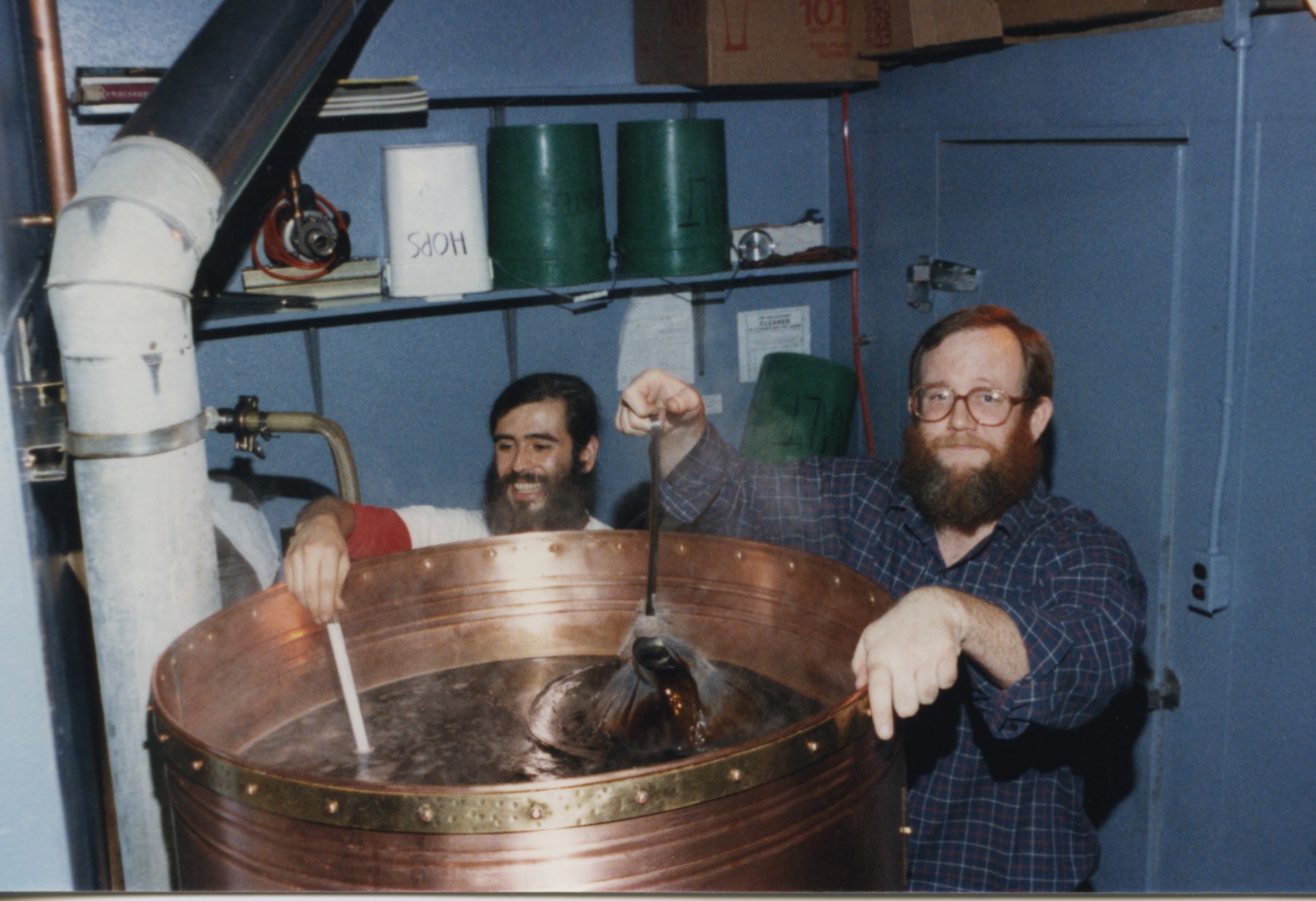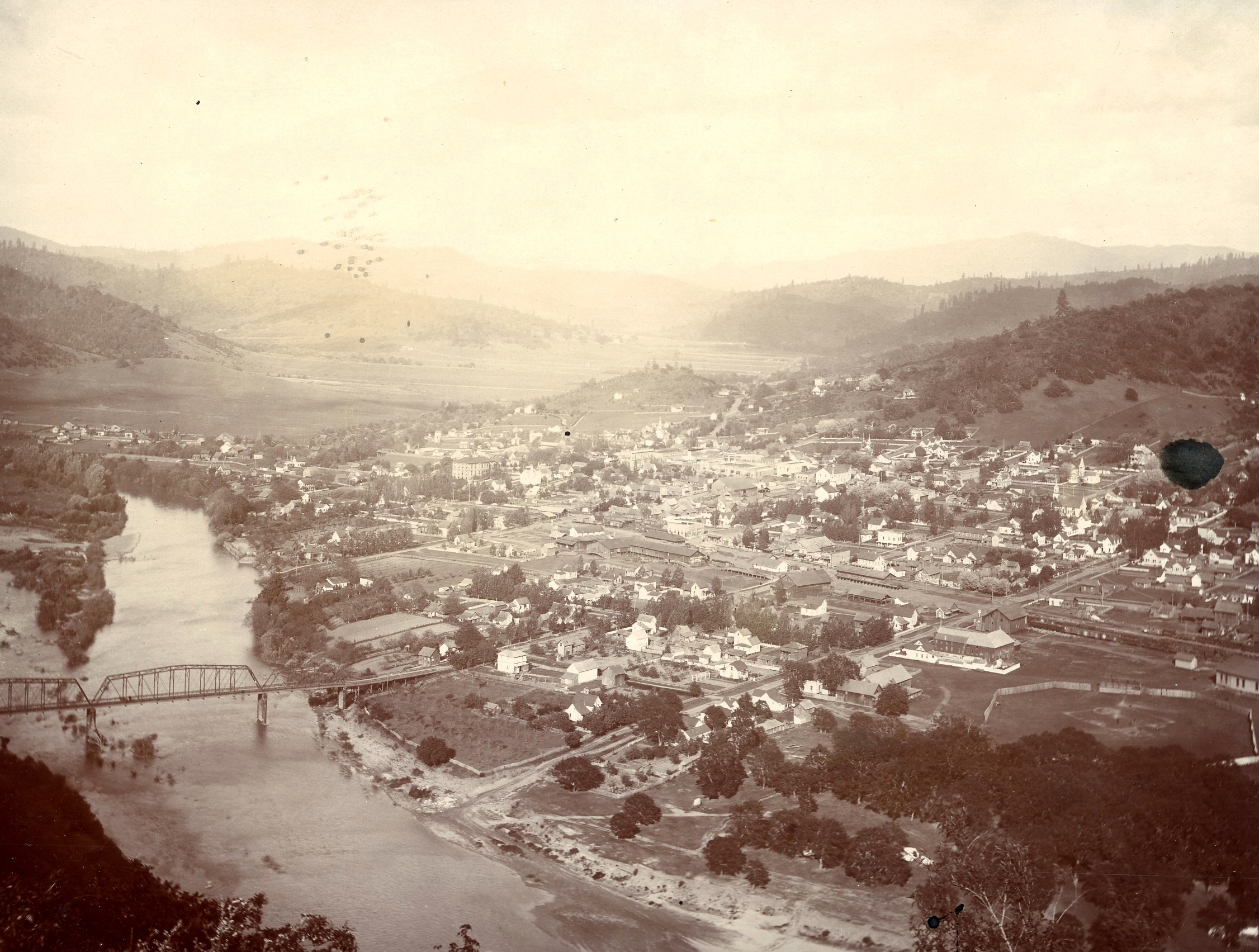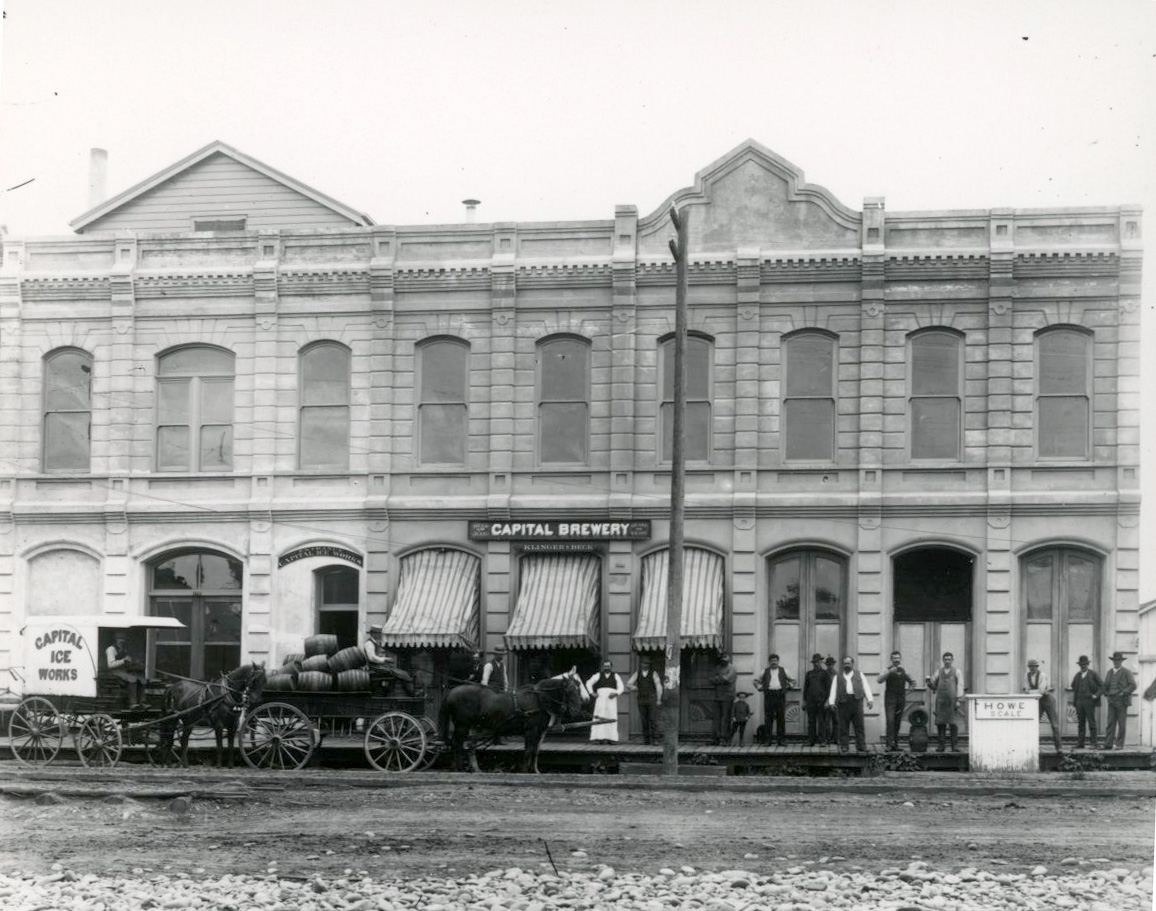McMenamins was founded by Mike and Brian McMenamin, brothers who grew up in northeast Portland. As of 2022, they own the company, with Mike serving as president and Brian as vice-president. The company has over sixty properties, including twelve hotels; dozens of breweries, pubs, and restaurants; movie theaters; music venues; and spas. It also owns a coffee roaster, winery, cidery, and distillery. Most of the company’s properties are rehabilitated historic buildings in Oregon and Washington; twenty are on the National Register of Historic Places.
Both McMenamins graduated from Oregon State University, Mike in political science (1974) and Brian in business (1980). In 1974, Mike McMenamin and two college friends purchased Produce Row Café in southeast Portland, where they sold over a hundred types of beer; he bought Bogart's Joint in 1975. By 1980, he had sold both restaurants.
Mike McMenamin then opened a wine distributorship, which failed, and in 1983 the brothers decided to open a new bar together. Rather than the smoky, male-dominated taverns common in Portland at the time, they were inspired by European public houses that served as community hubs. In 1983, they bought the Fat Little Rooster tavern in southeast Portland and renamed it the Barley Mill Pub. The pub became known for its Grateful Dead memorabilia and namesake barley mill, which had been used by Chuck Coury at Cartwright Brewing Company, the first new craft brewery to open in Oregon after the repeal of Prohibition.
In the 1980s, the McMenamins joined the owners of Portland Brewing, BridgePort Brewing, and Widmer Brothers Brewing to lobby for Senate Bill 813, known as the Brewpub Bill. The bill allowed breweries to brew and sell beer in the same location and was a major development in Oregon’s beer industry. Governor Vic Atiyeh signed it into law on July 13, 1985, and a few months later the McMenamins opened Hillsdale Brewery and Public House in southwest Portland, naming the attached brewery Captain Neon's Fermentation Chamber, a nod to Mike’s nickname. Ron Wolf brewed their first beer, Hillsdale Ale, a bitter made with malt extract. During the first year, several brewers moved through the facility, including Conrad Santos, John Harris, Scott Barrow, and Alex Farnham, the company’s first woman brewer.
In 1986, the company purchased a farmhouse in Hillsboro and turned it into Cornelius Pass Roadhouse. Later that year, it opened Lighthouse Brewpub in Lincoln City and, two years later, the Fulton Pub and Brewery and the Highland Pub and Brewery. McMenamins opened Oregon’s first theater pub in 1987—the Mission Theater in northwest Portland, originally a Swedish tabernacle built in the 1890s. In 2022, the company operated twenty-four breweries from Mill Creek, Washington, to Roseburg, Oregon. At first, some found McMenamins’ beers to be unsettling. They were made with apples, spices, and candy bars, for example, as well as chocolate and crystal malts. McMenamins also introduced fruit beers, with early batches featuring blackberries from the Hillsdale brewpub’s parking lot.
At the same time, the company developed three beers that are brewed at all of its breweries: Terminator Stout (1985), a dark, English-style brew; Ruby (1986), a light, raspberry-flavored beer; and Hammerhead (1986), a classic Northwest pale ale. Artist Lyle Hehn created what became iconic company characters, Ruby Witch and Hammerhead, which appear on the company’s murals, posters, and coasters.
McMenamins purchased some of the acreage and buildings that remained from the Multnomah County Poor Farm in 1987. The Poor Farm, built in 1911, had been a self-sufficient facility, with a meatpacking plant, power station, rooming house, and infirmary. McMenamins paid $560,000 for the buildings and 74 acres of land and invested $2.5 million to renovate it into a multiuse complex. When Edgefield Manor opened in 1991, the meatpacking plant had become a brewery, the power station a pub with a movie theater, and the main building and grounds were transformed into a hundred-room hotel, a restaurant, herb and flower gardens, a cigar bar, and a golf course. The McMenamins Edgefield Winery opened in 1992, and the distillery began operating in 1997. An amphitheater featured performances by a range of artists, including Machine Gun Kelly, Herbie Hancock, Fleet Foxes, "Weird Al" Yankovic, Wilco, The Decemberists, and Stevie Wonder. Edgefield also sponsored extensive art installations created by local artists. As at other McMenamins properties, art is exhibited throughout the complex. Within a few years of forming, the company employed twelve freelance artists to create works for new properties.
In 1991, McMenamins opened the Bagdad, a southeast Portland pub and movie house in a 1927 art deco theater that was slated for demolition. In 1997, the company purchased the Crystal Ballroom in downtown Portland. The 1911 building had been famous for its dance floor, which sat on ball bearings. The floor was unique on the Pacific Coast at the time of its installation and is believed to be the only one still in existence in the United States. Also in 1991, McMenamins partnered with the Portland Development Commission to remodel Kennedy Elementary School, making it into a hotel with a brewery, restaurant, movie theater, and soaking pool. Other historic property renovations followed in McMinnville, Forest Grove, Hillsboro, Salem, and Bend, and in Centralia, Bothell, and Kalama, Washington.
Historic preservation is integral to McMenamins’ business model. A small history department, led for nearly thirty years by historian Tim Hills, researches the buildings and neighborhoods and gathers community memories. Their work is incorporated into each property’s art, food, and architectural details. The department also sponsors a well-established program of public talks, with presentations that range from science to social justice to Oregon history.
In 2020, McMenamins sought outside investors to help retire its debt, offset the impact of COVID-19 closures, and fund new projects. During the active phase of the pandemic, they increased offerings in their online shop and expanded delivery options, created outdoor dining spaces, and released their first vodka. By 2022, the number of employees had declined from more than 3,500 to just under 800. The estimated revenues in 2022 exceeded $200 million.
-
![]()
Carlos Santos and Mike McMenamin, Hillsdale, Dec. 5, 1985.
Courtesy Oregon State University Libraries, McMenamins Brewery Collection (MSS McMenamins) -
![]()
McMenamins Ruby Ale coaster, c.1995.
Courtesy Oregon State University Libraries, McMenamins Brewery Collection (MSS McMenamins) -
![]()
Captain Neon's fermentation chamber, McMenamins, Hillsdale, Dec. 5, 1985.
Courtesy Oregon State University Libraries, McMenamins Brewery Collection (MSS McMenamins) -
![]()
Mike McMenamin, Hillsdale, Dec. 5, 1985.
Courtesy Oregon State University Libraries, McMenamins Brewery Collection (MSS McMenamins) -
![]()
Mike McMenamin and Carlos Santos, Hillsdale, December 5, 1985.
Courtesy Oregon State University Libraries, McMenamins Brewery Collection (MSS McMenamins) -
![]()
First sketch of the McMenamins iconic Hammerhead, c.1986.
Courtesy Oregon State University Libraries, McMenamins Brewery Collection (MSS McMenamins) -
![]()
Muralist Myrna Yoder, McMenamins Crystal Ballroom, c.1997.
Courtesy Oregon State University Libraries, McMenamins Brewery Collection (MSS McMenamins)
Documents
Related Entries
-
![Bagdad Theater]()
Bagdad Theater
From its grand opening on January 14, 1927, as movie theater and “Oasis…
-
![Brewing industry in Oregon]()
Brewing industry in Oregon
High-quality water and ideal conditions for growing hops set the stage …
-
![Full Sail Brewing Company]()
Full Sail Brewing Company
Founded in 1987 in Hood River, the Full Sail Brewing Company is one of …
-
![Multnomah County Poor Farm (Edgefield)]()
Multnomah County Poor Farm (Edgefield)
The Multnomah County Poor Farm in Troutdale was built in 1911 to replac…
-
![Rast Brewery]()
Rast Brewery
The inaugural issue of the Roseburg Ensign, on April 30, 1867, advertis…
-
![Salem Brewery Association]()
Salem Brewery Association
The Salem Brewery Association, incorporated in 1903, was at one time th…
Map This on the Oregon History WayFinder
The Oregon History Wayfinder is an interactive map that identifies significant places, people, and events in Oregon history.
Further Reading
Dunlop, Pete. Portland Beer: Crafting the Road to Beervana. Charleston, SC: The History Press, 2013.
McMenamins Blog: Writings from the Historians.
McMenamins Property Histories.
Morrison, Lisa M. Craft Beers of the Pacific Northwest: A Beer Lover's Guide to Oregon, Washington, and British Columbia. Portland, Ore.: Timber Press, 2011.
Yaeger, Brian. Oregon Breweries. Mechanicsburg, PA: Stackpole Books, 2014.













